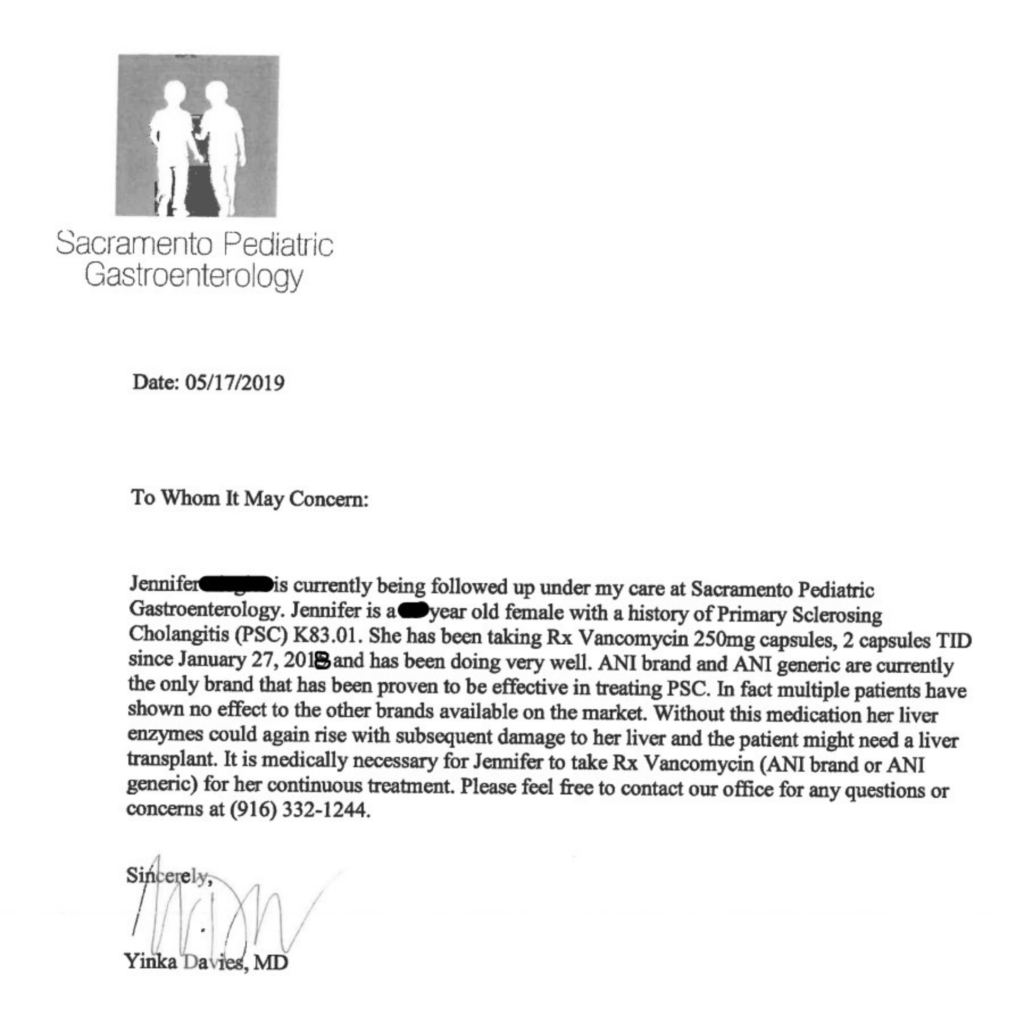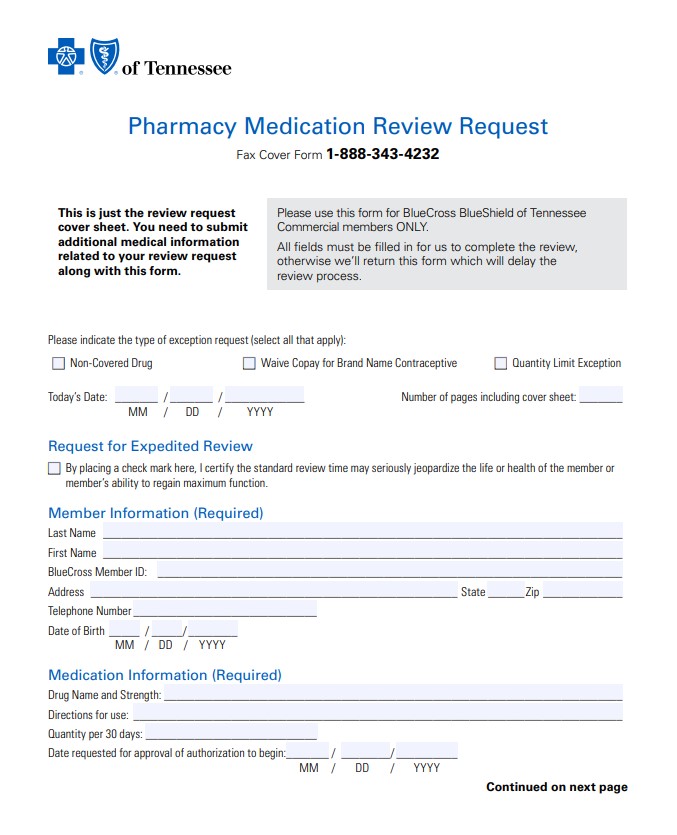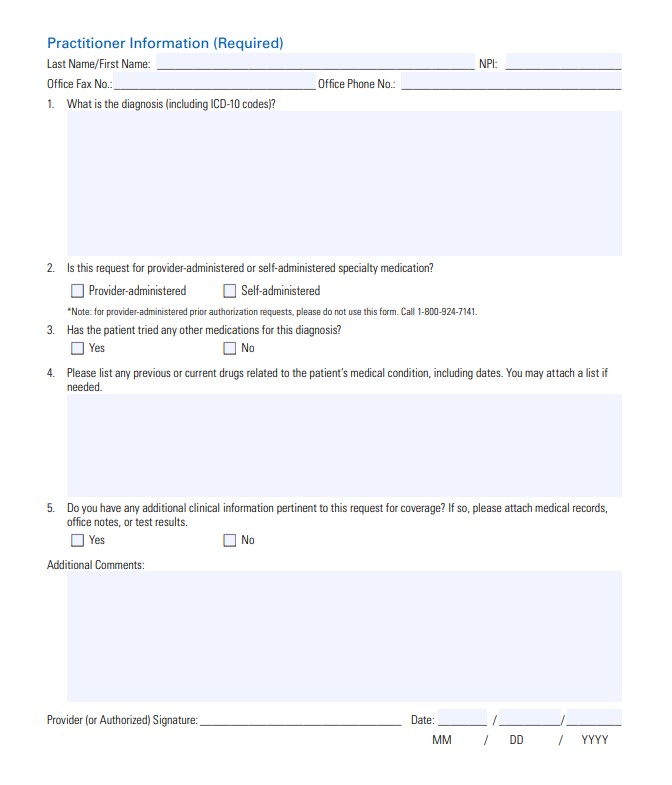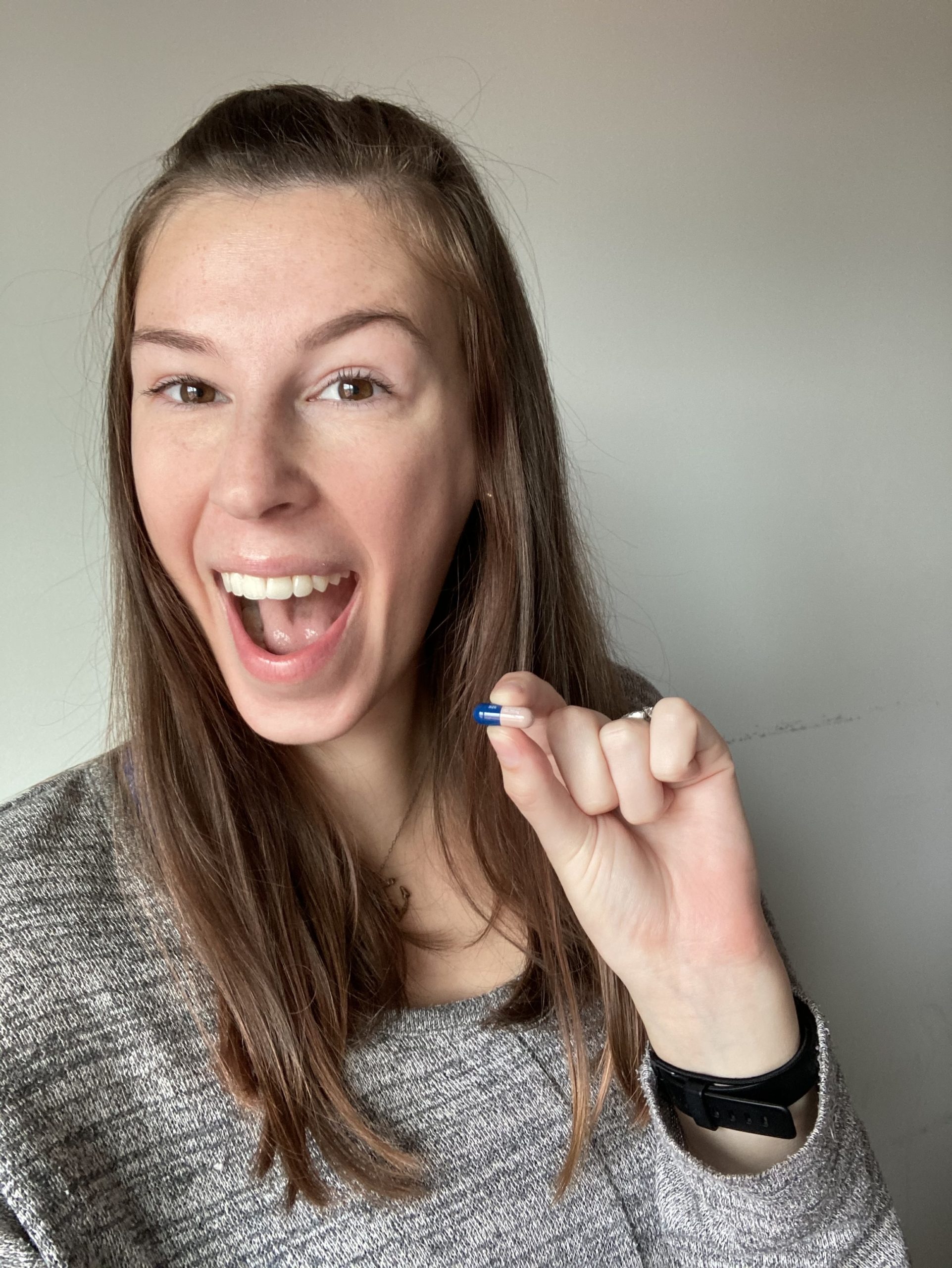Vancomycin can be difficult for PSC patients to access. There are four reasons that explain why this is our unfortunate reality, and they all stem from one main reason: we need more research.
Now, personally, I believe the existing studies, case reports, and anecdotal evidence from the PSC community is enough to let every PSC patient try vancomycin. Unfortunately, the FDA and many doctors don’t agree.
Despite the existing research and incredible anecdotal evidence of vancomycin’s efficacy, and despite the fact that no significant harm from oral vancomycin has ever been published, many doctors refuse to prescribe it for their patients—even when the patient’s disease is progressing toward cirrhosis and even though there are no other options.
I believe this is incredibly unjust. Vancomycin saved my life, and I believe all PSC patients should have the opportunity to try it if they want to.
On this page, you’ll learn lots of practical tips on the following topics to help you access vancomycin:
- Why it’s difficult to access vancomycin and tips on what to do about it
- Steps to take if your doctor won’t prescribe vancomycin
- Tips to get your insurance to cover vancomycin

4 Reasons Why It’s Difficult to Access Vancomycin
(Plus Tips on What to Do About It)
1. Vancomycin Has Not Been FDA-Approved for PSC
Due to the small patient community and a lack of funding, there have been no large-scale, randomized controlled clinical trials with a placebo arm. These kinds of trials are the “gold standard” to get drugs FDA-approved. Without the FDA’s stamp of approval, many doctors are hesitant to prescribe vancomycin for PSC.
Solution
We need funding for research! The first step to getting vancomycin FDA-approved for PSC is proving its efficacy in a randomized controlled trial. The sooner we prove vancomycin’s efficacy and understand the variables that impact its effectiveness, the sooner it’ll get FDA-approved; then it’ll be much easier to access.
You can help support vancomycin research by donating to an organization that has announced an interest in vancomycin. Currently, the only organization that publicly supports vancomycin for PSC is the Children’s PSC Foundation.
2. There Are at Least 5 Variables That Impact Vancomycin’s Efficacy
There are at least five efficacy factors that impact how effective vancomycin is in managing PSC. Two of the most common factors are vancomycin’s brand and dose. (You can read full details about these five variables here).
If a doctor is unfamiliar with these variables and doesn’t take them into consideration when they prescribe vancomycin for their PSC patient, the patient might not respond. When this happens, doctors typically chalk it up to saying, “vancomycin doesn’t work” and they stop prescribing it to future patients. (But, when doctors follow the best practices, vancomycin can have some great results.)
Solution
Educate your doctor about these five variables! Share research papers (like this one) and case reports (like this and this!) that touch on these efficacy factors and show vancomycin’s promising results. You can also share others’ experiences that you read in Facebook groups or this page of the PSC Hub.
Working with your doctor is a partnership, so never be afraid to share your knowledge. When doctors are familiar with vancomycin’s efficacy factors, they are usually more open to prescribing vancomycin—or at least prescribing a three-month trial!
3. Doctors and Insurance Companies are Not Aware of the Current Vancomycin Research
Did you know that PSC is so rare that most gastroenterologists will never have a PSC patient in their career? Because of this, it makes more sense why so many GIs aren’t familiar with vancomycin for PSC: they haven’t kept up with the literature because they haven’t had a reason to.
And, if a GI does get a PSC patient, they likely didn’t learn about vancomycin therapy in their textbooks.
Unfortunately, this means that pharmacies and insurance companies are not familiar with vancomycin for PSC either. This is why pharmacies don’t order specific brands for PSC patients and why there are insurance barriers; they simply aren’t aware!
Solution
Educate your doctors and pharmacy team. Email or print research papers and share them with your doctor. You can also send them links to vancomycin presentations (like this roundtable by Dr. Cox and Dr. El-Youssef or this podcast episode featuring Dr. Tabibian). You can also refer your doctor to this PSC Hub.
Additionally, talk with your insurance company to learn what appeals/paperwork you might need to submit to ensure you get the right quantity, brand, dose, etc.
It’s unfortunate that we, as the patients, need to be the ones to educate our medical teams about vancomycin for PSC, but doing this paves a way and can help make vancomycin more accessible to others.
4. Doctors are Fearful of the Long-term Effects of Vancomycin and That Patients Could Develop Vancomycin-resistant Bacteria
A common reason doctors will not prescribe vancomycin for their patients is because they’re afraid the patient may develop a vancomycin-resistant infection; one concern is over vancomycin-resistant enterococcus bacteria (VRE). Also, vancomycin is the primary drug used for C. difficile infections (though there are other treatment options, as well). C. difficile may sometimes acquire resistance to vancomycin. Many doctors are also uncertain about the side effects of taking vancomycin long-term.
The good news is that I’ve spoken with various gastroenterologists and PSC researchers, and they have never heard of VRE within the PSC community. And vancomycin has been prescribed for PSC since 1993! Of course, it’s impossible to say that it won’t ever happen. But up to this point, it appears that PSC patients haven’t experienced VRE or any other side effects from oral vancomycin, and some patients have been taking the drug for 10+ years. Plus, C. difficile resistance develops, there are other options for treatment.
Solution
Explain this paragraph above to your doctor! Additionally, there are three more sound arguments you can bring up with your medical team:
1. Discuss the low risk, high reward of taking vancomycin
Wouldn’t it be worth it to take a chance on vancomycin and have a low risk of developing side effects or VRE rather than not take vancomycin and have a high risk of cirrhosis, liver failure, or transplant? I think so. If you think so too, tell your doctor this.
2. understand that c. diff infections can be treated with drugs other than vancomycin
Some doctors won’t prescribe vancomycin to their PSC patients because they’re afraid you’ll become resistant to vancomycin if you need to take it for a C. diff infection. Luckily, there are other medications, such as fidaxomicin and metronidazole, that can be used to clear C. diff infections. So, in the off-chance a PSC patient does develop resistance and then gets C. diff, there are other treatments that can clear the infection.
3. Compare vancomycin to other common drugs with known side effects
Ask your doctor why physicians often prescribe drugs like Remicade, for example, (which has a long list of potential side effects), but they won’t prescribe oral vancomycin (which has no known side effects and is therefore low risk.) This isn’t meant to come across as rude or snarky—ask your doctor genuinely. Perhaps they’ll start to see your point of view, or visa versa.

6 Steps to Take if Your Doctor Won’t Prescribe Vancomycin
No luck getting a vancomycin prescription from your doctor? I know it can be disheartening, but there are still some things you can do!
Step 1: Ask for a Three-Month Trial
As the patient, you are empowered. Don’t feel bad about advocating for what you want. Request that your doctor prescribe you vancomycin for a three-month trial. Some doctors may be more open to a short-term trial before committing to a long-term prescription. Plus, positive results are typically noticed within three months of starting vancomycin.
Step 2: Share Research with Your Doctor
Many doctors won’t prescribe vancomycin for PSC simply because they’re unfamiliar with the research. If you show them the published papers and case studies, they might be willing to give it a shot.
This review article is always the first one I recommend that patients show their doctor. You might want to pair it with this one and this one to further support your ideas.
Step 3: Get a Second Opinion
If your doctor still doesn’t feel comfortable prescribing you vancomycin, it’s time to seek a second opinion. Try calling nearby gastroenterologists and hepatologists and, before you set up a consultation, ask if they prescribe vancomycin to their PSC patients and if they’re familiar with the research.
If they typically don’t prescribe it but they say they might consider it on a case-by-case scenario, it might be worth scheduling an in-person appointment with them to chat about it. Be sure to bring the research papers with you!
Step 4: Be Open to Seeing an Out-of-State Doctor
If you can’t find a local doctor willing to prescribe vancomycin, you may need to see an out-of-state doctor. If an out-of-state doctor is willing to prescribe you vancomycin, you might need to travel for your initial consultation, but hopefully you can do virtual appointments on an ongoing basis. Usually, out-of-state doctors can order your vancomycin to your local pharmacy; you might even be able to do maintenance testing (ie. fibroscans, MRCPs, colonoscopies, etc) locally instead of traveling each time. Chat with the doctor about this.
I know out-of-state doctors aren’t ideal, but if you really want vancomycin for yourself or your child, it’ll be worth it. (I live in Tennessee and my amazing PSC doctor is in California!) Just remember to do your due diligence and make sure the out-of-state doctor is covered by your insurance.
Feel free to contact me if you need out-of-state recommendations. I’ll do my best to refer you to one, though keep in mind that doctors are licensed and insured to practice in a particular state(s), which may their ability to take you on as a patient. It’s absolutely worth a shot!
Step 5: Ask for Physician Recommendations
If you’re looking for either a local or out-of-state doctor, utilize the search bar in PSC Facebook groups (this PSC Support Group is my favorite!) People often share the name of their doctor who prescribes their vancomycin.
Or, you can send me a message. I can check with my connections in the PSC community and we can try to find you pro-vancomycin doctor.
Step 6: Join a Clinical Trial
If you can’t find a local or out-of-state doctor and still really want vancomycin, consider joining a clinical trial. I know this isn’t ideal, but if you’re out of other options, it might be your best chance at getting vancomycin. Just be aware there is a chance you will get the placebo.
As of July 2022, there is one clinical trials in the US that’s recruiting:
- “Vancomycin for Primary Sclerosing Cholangitis” which is based on the Mayo Clinic campuses in Arizona, Florida, and Minnesota.

2 Types of Paperwork to Fill Out if Your Insurance Company Does Not Cover Vancomycin
Learn about submitting a general appeal and a Quantity Override Form
Since vancomycin for PSC is not FDA-approved, this can cause some insurance barriers. One issue PSC patients face is that their insurance won’t cover the cost of vancomycin. A similar issue is when insurance will only allow the patient to pick up a limited quantity. If either of these things happen to you, you’ll need to file an appeal.
What Documents are Required When Filing an Appeal to get Vancomycin Covered by Insurance?
You might need to send a general appeal or a Quantity Override to your insurance. Every insurance company is different, but you’ll likely need to mail the following documents:
1. Letter of Medical Necessity
This is a letter written by your gastroenterologist/hepatologist. Your doctor’s office should be familiar with what’s required in the letter, but here are some things you should make sure are included:
- Why you need vancomycin and what could happen if you don’t take it. Example: The patient has a history of primary sclerosing cholangitis (PSC) K83.01. Without this medication, the patient’s liver enzymes could rise with subsequent damage to the liver and the patient might need a liver transplant. Also, their colitis could return. Vancomycin is medically necessary for the patient’s continuous treatment.
- The required brand. Example: ANI Pharmaceuticals brand or ANI Pharmaceuticals generic.
- The required dosage (in mg). It’s best to include the individual pill strength and the total mg you’ll be taking each day. Example: The patient needs two 250 mg capsules three times per day (1,500 mg per day).
- The required pill quantity you need each month. Example: With this dosage, the patient requires 180 pills per month.
- Supplemental information. For example, your doctor might include your liver numbers before and after taking vancomycin; results from a FibroScan, MRCP, or other procedure; or any other information your doctor thinks will help your insurance approve the appeal.
Here’s my letter of medical necessity that I submitted to my insurance company. Your doctor should be familiar with what to write, but feel free to share it with them as a template.
*Please note: Since this letter was written, other patients have responded successfully to additional the brands of Lupin and Firvanq. Your doctor should adjust this phrasing in your letter. For me, I will continue to have my doctor specify that I, personally, need the ANI brand since that’s what I’ve been on since the start.

2. Research Papers
Your insurance company may require research papers to further support the use of vancomycin for PSC. These are the best articles I recommend you send, unless your doctor suggests you send a different one:
- Review article: the evidence that vancomycin is a therapeutic option for primary sclerosing cholangitis
- Open-Label Prospective Therapeutic Clinical Trials: Oral Vancomycin in Children and Adults with Primary Sclerosing Cholangitis
- Successful Response of Primary Sclerosing Cholangitis and Associated Ulcerative Colitis to Oral Vancomycin May Depend on Brand and Personalized Dose
You probably don’t need to send all three. I sent only the first one to my insurance company and it got approved.
What to Do if Your Insurance Limits the Quantity of Vancomycin Pills You’re Allowed to Pick Up Each Month?
Some insurance companies will cover the cost of vancomycin, but will only allow you to pick up a limited pill quantity per month. This was a huge problem for me because I take 1,500 mg of vancomycin each day, which is 180 pills each month. But my insurance only allowed me 90 pills per month. (This is because vancomycin is usually only prescribed for C. diff infections, which require a much lower quantity of pills).
If this happens to you, you’ll need to fill out what I call a Quantity Override Form. Sometimes it’s called a Pharmacy Medication Review Request, a Prescription Exception Request, or a Pharmaceutical Exception Request. You should be able to download this form from your insurance company’s website or call and ask them to email it to you. Here’s what my form looks like:


I have to mail a Quantity Override Form to my insurance company every single year to receive annual approval. Additionally, I need to include a letter of medical necessity and a research paper to ensure it gets approved.
Pro Tips for Sending the Paperwork to Your Insurance Company
- Call your insurance to clarify the required documents. Once you’ve determined if you need to file an appeal or a Quantity Override Form, call your insurance company to clarify all the required documents and how often you’ll need to submit them; your insurance company might have different requirements than mine.
- Ask your insurance company if they want the paperwork mailed, emailed, or faxed. Be sure to collect the proper mailing address, email address, or fax number so you know it’s delivered to the right department. If you don’t have access to a fax machine, you can send electronic faxes through a service like FAX.PLUS.
- Make yourself a copy of every single paper you send. It’s crucial to have a paper trail for something as important as getting access to vancomycin.
- Start this process as early as possible. The first time I submitted my Quantity Override, it took weeks to get approved and I had to buy vancomycin out-of-pocket until it was approved. It was such a hassle.
- Write down the approval confirmation number. If your appeal/Quantity Override gets approved, be sure to take down the approval confirmation number: write it in your medical binder or type it into a note on your phone. Why? Because if you need to submit this paperwork annually, including the prior year’s approval confirmation number should help it get approved quickly in the following years.
Pages to Visit Next

Vancomycin for PSC: How it works, efficacy factors, safety, side effects, and best practices

My PSC Story: From elevated liver numbers to liver biopsy to vancomycin prescription

PSC and Vancomycin Resources: Research papers, articles, videos, and more

Vancomycin Success Stories: Stories from PSC patients and their families

Accessing Vancomycin: Tips to getting a prescription from your doctor, receiving it at your pharmacy, and getting it covered by insurance

Get Involved: Projects I’m working on and what you can do to help